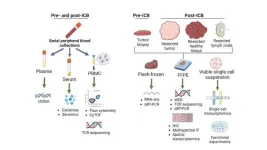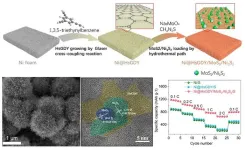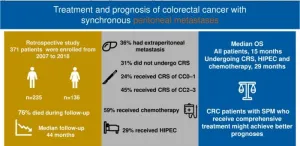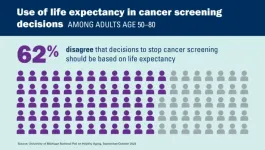(Press-News.org) SARS-CoV-2, the virus that causes COVID-19, can directly infect the arteries of the heart and cause the fatty plaque inside arteries to become highly inflamed, increasing the risk of heart attack and stroke, according to a study funded by the National Institutes of Health. The findings, published in the journal Nature Cardiovascular Research, may help explain why certain people who get COVID-19 have a greater chance of developing cardiovascular disease, or if they already have it, develop more heart-related complications.
In the study, researchers focused on older people with fatty buildup, known as atherosclerotic plaque, who died from COVID-19. However, because the researchers found the virus infects and replicates in the arteries no matter the levels of plaque, the findings could have broader implications for anybody who gets COVID-19.
“Since the early days of the pandemic, we have known that people who had COVID-19 have an increased risk for cardiovascular disease or stroke up to one year after infection,” said Michelle Olive, Ph.D., acting associate director of the Basic and Early Translational Research Program at the National Heart, Lung, and Blood Institute (NHLBI), part of NIH. “We believe we have uncovered one of the reasons why.”
Though previous studies have shown that SARS-CoV-2 can directly infect tissues such as the brain and lungs, less was known about its effect on the coronary arteries. Researchers knew that after the virus reaches the cells, the body’s immune system sends in white blood cells known as macrophages to help clear the virus. In the arteries, macrophages also help remove cholesterol, and when they become overloaded with cholesterol, they morph into a specialized type of cell called foam cells.
The researchers thought that if SARS-CoV-2 could directly infect arterial cells, the macrophages that normally are turned loose might increase inflammation in the existing plaque, explained Chiara Giannarelli, M.D., Ph.D., associate professor in the departments of medicine and pathology at New York University’s Grossman School of Medicine and senior author on the study. To test their theory, Giannarelli and her team took tissue from the coronary arteries and plaque of people who had died from COVID-19 and confirmed the virus was in those tissues. Then they took arterial and plaque cells – including macrophages and foam cells – from healthy patients and infected them with SARS-CoV-2 in a lab dish. They found that the virus had also infected those cells and tissues.
Additionally, the researchers found that when they compared the infection rates of SARS-CoV-2, they showed that the virus infects macrophages at a higher rate than other arterial cells. Cholesterol-laden foam cells were the most susceptible to infection and unable to readily clear the virus. This suggested that foam cells might act as a reservoir of SARS-CoV-2 in the atherosclerotic plaque. Having more build-up of plaque, and thus a greater number of foam cells, could increase the severity or persistence of COVID-19.
The researchers then turned their attention to the inflammation they predicted might occur in the plaque after infecting it with the virus. They quickly documented the release of molecules, known as cytokines, that are known to increase inflammation and promote the formation of even more plaque. The cytokines were released by infected macrophages and foam cells. The researchers said this may help explain why people who have underlying plaque buildup and then get COVID-19 may have cardiovascular complications long after getting the infection.
“This study is incredibly important as it adds to the larger body of work to better understand COVID-19,” said Olive. “This is just one more study that demonstrates how the virus both infects and causes inflammation in many cells and tissues throughout the body. Ultimately, this is information that will inform future research on both acute and Long COVID.”
Though the findings conclusively show that SARS-CoV-2 can infect and replicate in the macrophages of plaques and arterial cells, they are only relevant to the original strains of SARS-CoV-2 that circulated in New York City between May 2020 and May 2021. The study was conducted in a small cohort of older individuals, all of whom had atherosclerosis and other medical conditions; therefore, the results cannot be generalized to younger, healthy individuals.
This work was funded by the NIH/NHLBI grants 1R01HL165258, R01HL153712, R35HL135799 and R01HL084312. NIAID and NIDDK also provided funding.
Study: Eberhardt, N., et al. SARS-CoV-2 infection triggers pro-atherogenic inflammatory responses in human coronary vessels. Nat Cardiovasc Res doi: 10.1038/s44161-023-00336-5.
###
About the National Heart, Lung, and Blood Institute (NHLBI): NHLBI is the global leader in conducting and supporting research in heart, lung, and blood diseases and sleep disorders that advances scientific knowledge, improves public health, and saves lives. For more information, visit www.nhlbi.nih.gov.
About the National Institutes of Health (NIH): NIH, the nation's medical research agency, includes 27 Institutes and Centers and is a component of the U.S. Department of Health and Human Services. NIH is the primary federal agency conducting and supporting basic, clinical, and translational medical research, and is investigating the causes, treatments, and cures for both common and rare diseases. For more information about NIH and its programs, visit www.nih.gov.
END
Treating cancer with immunotherapies known as an immune checkpoint blockade (ICB) prior to surgery (so-called neoadjuvant immunotherapy) has been a rapidly growing area of research, but the scientific community is just scratching the surface of what is possible, according to a review article co-authored by several current and former investigators from the Bloomberg~Kimmel Institute for Cancer Immunotherapy and the Johns Hopkins Kimmel Cancer Center.
“We consider this approach to cancer immunotherapy to be a gold mine ...
They published their work on Sep. 26 in Energy Material Advances.
"The booming progress of electric vehicles demands next-generation energy storage technologies with high energy density, low cost, and longevity." said Lu, a professor at the college of chemistry and chemical engineering in Shantou university. "Lithium-sulfur batteries are identified as a promising energy storage system because of their high ultrahigh energy density and large theoretical capacity. However, they are limited by the poor electronic conductivity of sulfur, volume changes of the cathode, and shuttle effect."
Lu explained that the conversion of polysulfides (Li2Sn, ...
Patients with acute kidney injury requiring outpatient dialysis after hospital discharge receive the same care as those with the more common end-stage kidney disease, according to a study led by UC San Francisco.
But while patients with the latter diagnosis – typically caused by long-standing hypertension or diabetes – must remain on lifelong dialysis or receive a new kidney, some patients on dialysis for acute kidney injury have the potential to recover, the researchers reported in their study in the Journal of the American Society of Nephrology on Sept. 28, 2023.
“For ...
INDIANAPOLIS – A new study led by a U.S. Department of Veterans Affairs, Regenstrief Institute and Indiana University School of Medicine researcher focuses on empowering minoritized patients with chronic back and other musculoskeletal pain to receive care best suited to their individual values and preferences. Black patients continue to experience greater pain severity, worse pain outcomes and inadequate pain treatment compared to White patients, despite national priorities focused on health equity.
COOPERATE (Communication and Activation in Pain to Enhance Relationships ...
A pivotal breakthrough in battery technology that has profound implications for our energy future has been achieved by a joint-research team led by City University of Hong Kong (CityU).
The new development overcomes the persistent challenge of voltage decay and can lead to significantly higher energy storage capacity.
Lithium-ion batteries (LiBs) are widely used in electronic devices, while lithium-(Li) and manganese-rich (LMR) layered oxides are a promising class of cathodes for LiBs due to their high ...
Colorectal cancer (CRC) with synchronous peritoneal metastases (SPM) is a challenging disease to treat, with a relatively poor prognosis. However, recent advances in treatment strategies have led to improved outcomes for patients with SPM.
The optimal treatment approach for CRC with SPM remains controversial. A growing body of evidence suggests that comprehensive treatment, including cytoreductive surgery (CRS), chemotherapy, and hyperthermic intraperitoneal chemotherapy (HIPEC), may improve patient outcomes.
A ...
In a groundbreaking review published in Nature Energy, Professor Jaephil Cho from the School of Energy and Chemical Engineering at UNIST presents an analysis protocol to evaluate silicon cathode materials applicable to commercialized batteries. The study delves deep into the characteristics and challenges surrounding silicon anode materials—the focus of significant attention as secondary battery components.
Silicon has emerged as a promising alternative to conventional graphite anodes in high-energy lithium-ion batteries due to its exceptional gravimetric capacity. However, intrinsic issues such as severe volume expansion during cycling have hindered the widespread ...
Two Mount Sinai Health System hospitals are among the top-ranked for “America’s Best Physical Rehabilitation Centers for 2023” by Newsweek/Statista.
The Mount Sinai Hospital is ranked No. 2 in New York State for inpatient rehabilitation care, with stroke care designated as a “Standout Program.” Mount Sinai Morningside, on Manhattan’s Upper West Side, is ranked No. 5 for inpatient rehabilitation. These prestigious accolades highlight the exceptional quality of care and follow-up care, along with accommodations and amenities that are part of the rehabilitation ...
COLUMBUS, Ohio – In lonely people, the boundary between real friends and favorite fictional characters gets blurred in the part of the brain that is active when thinking about others, a new study found.
Researchers scanned the brains of people who were fans of “Game of Thrones” while they thought about various characters in the show and about their real friends. All participants had taken a test measuring loneliness.
The difference between those who scored highest on loneliness and those who ...
A majority of older adults disagree with the idea of using life expectancy as part of guidelines that say which patients should get cancer screenings such as mammograms and colonoscopies, a new poll finds.
In all, 62% of people aged 50 to 80 said that national guidelines for stopping cancer-detecting tests in individual patients should not be based on how long that person might have left to live, according to new results from the University of Michigan National Poll on Healthy Aging.
That goes against a trend in such guidelines, which national organizations develop based on medical evidence. Guidelines ...




